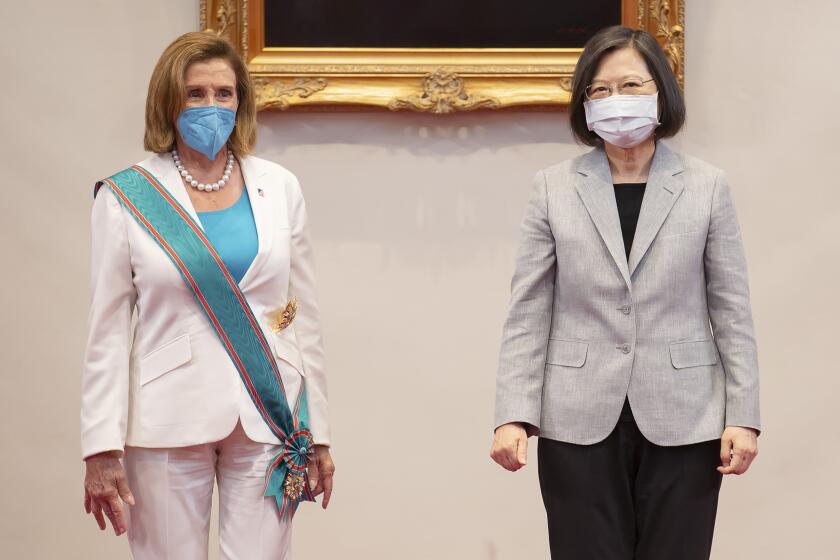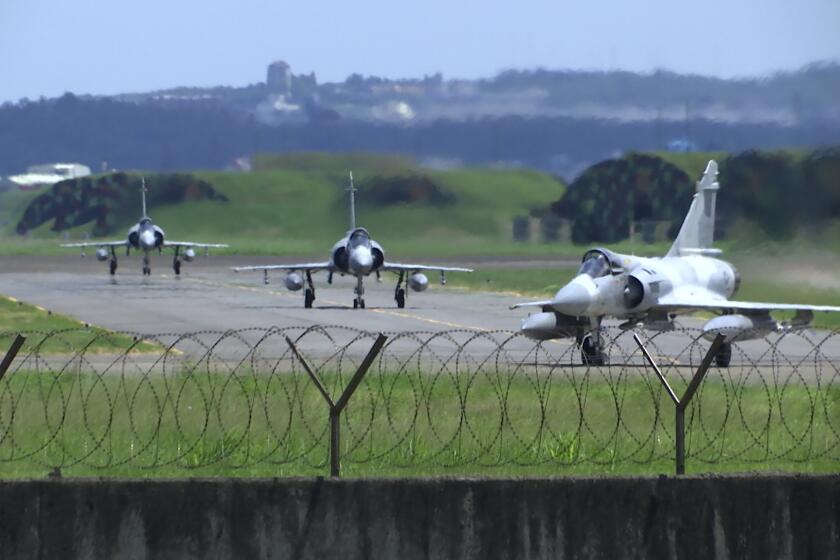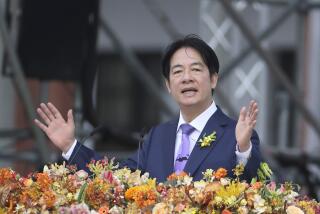China announces more military drills as U.S. lawmakers, including 2 Californians, visit Taiwan

- Share via
TAIPEI, Taiwan — China announced more military drills around Taiwan as the self-governing island’s president met with a new delegation of U.S. Congress members — including two from California — on Monday, threatening to renew tensions between Beijing and Washington just days after a similar visit by House Speaker Nancy Pelosi angered China.
Pelosi (D-San Francisco) was the highest-level member of the U.S. government to visit Taiwan in 25 years, and her trip prompted nearly two weeks of threatening military exercises by China, which claims the island as its own. Beijing fired missiles over the island and into the Taiwan Strait and sent warplanes and naval ships across the waterway’s midline, which has long been a buffer between Taiwan and the mainland, which separated politically in 1949 after civil war.
The latest U.S. congressional trip to Taiwan began Sunday with little notice ahead of time. The delegation was due to leave late Monday.
China accuses the U.S. of encouraging the island’s independence through the sale of weapons and engagement between U.S. politicians and the island’s government. Washington says it does not support independence, has no formal diplomatic ties with the island and maintains that the two sides should settle their dispute peacefully — but it is legally bound to ensure the island can defend itself against any attack.
“China will take resolute and strong measures to defend national sovereignty and territorial integrity,” Chinese Foreign Ministry spokesman Wang Wenbin said at a daily briefing Monday, after Beijing announced new drills in the seas and skies surrounding Taiwan. “A handful of U.S. politicians, in collusion with the separatist forces of Taiwan independence, are trying to challenge the one-China principle, which is out of their depth and doomed to failure.”
The new exercises were intended to be a “resolute response and solemn deterrent against collusion and provocation between the U.S. and Taiwan,” the Chinese Defense Ministry said earlier.
China’s furious response could drive more Taiwanese toward independence and push neighboring Asian nations to strengthen their defense strategies.
It was not clear if the new drills had already started since the ministry gave no details about where and when they would be conducted, in contrast to previous rounds.
The five-member U.S. congressional delegation, led by Sen. Edward J. Markey (D-Mass.) and including Reps. John Garamendi (D-Walnut Grove) and Alan Lowenthal (D-Long Beach), met with Taiwanese President Tsai Ing-wen, Foreign Minister Joseph Wu and legislators, according to the American Institute in Taiwan, Washington’s de facto embassy on the island.
At their meeting, Tsai said her administration was working with allies to ensure stability in the Taiwan Strait and to maintain the status quo — a reference to the island’s self-governance, separate from Beijing.
“Russia’s invasion of Ukraine earlier this year has shown the threat that authoritarian nations pose to the global order,” Tsai said.
Climate change and fighting trade in illegal drugs such as fentanyl are rare areas where China and the U.S. have found common cause.
Markey responded by saying Washington and Taipei had a “moral obligation to do everything we can to prevent an unnecessary conflict, and Taiwan has demonstrated incredible restraint and discretion during challenging times.”
Markey also highlighted legislation intended to boost U.S. political and economic ties with Taiwan, especially in the critical semiconductor industry. Taiwan is a crucial provider of computer chips for the global economy, including China’s high-tech sectors, and beyond the geopolitical risks of rising tensions in the region, an extended crisis in the Taiwan Strait could have major implications for international supply chains at a time when the world is already facing disruptions and uncertainty.
Markey is one of the few members of Congress still serving who voted for the 1979 Taiwan Relations Act that ensured continued relations with the island following the switch of U.S. diplomatic recognition from Taipei to Beijing.
China says it wants to use peaceful means to bring Taiwan under its control, but its recent saber-rattling has emphasized its threat to reunify by force if necessary. The earlier drills appeared to be designed as a rehearsal of a blockade or attack on Taiwan that would force the cancellation of commercial flights and disrupt shipping to Taiwan’s main ports as well as cargo passage through the Taiwan Strait, one of the world’s busiest shipping lanes.
Breaking News
Get breaking news, investigations, analysis and more signature journalism from the Los Angeles Times in your inbox.
You may occasionally receive promotional content from the Los Angeles Times.
The exercises prompted Taiwan to put its military on alert, but were met largely with defiance and apathy by the Taiwanese public.
The American “visit at this time is of great significance, because the Chinese military exercise is [intended] to deter U.S. congressmen from visiting Taiwan,” Lo Chih-cheng, the chair of the Taiwanese legislature’s Foreign and National Defense Committee, said after meeting with the delegation.
“Their visit this time proves that China cannot stop politicians from any country to visit Taiwan, and it also conveys an important message that the American people stand with the Taiwanese people,” Lo said.
A senior White House official on Asia policy said last week that China had used Pelosi’s visit as a pretext to launch an intensified pressure campaign against Taiwan, jeopardizing peace and stability across the Taiwan Strait and in the broader region.
“China has overreacted, and its actions continue to be provocative, destabilizing and unprecedented,” Kurt Campbell, a deputy assistant to President Biden, said on a call with reporters.
More to Read
Sign up for Essential California
The most important California stories and recommendations in your inbox every morning.
You may occasionally receive promotional content from the Los Angeles Times.












